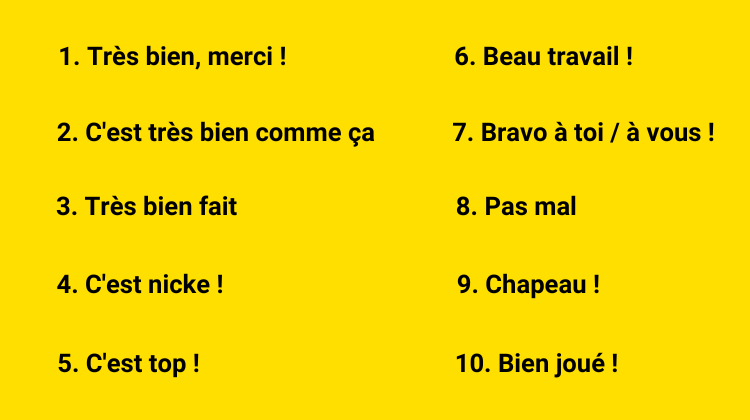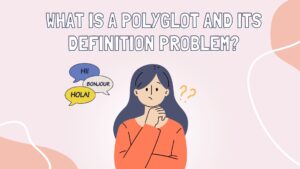🥱 Tired of relying on the same old expression to convey your approval in French? If you’re constantly using ‘très bien’ to describe everything from a delicious meal to a successful project, it’s time to branch out.
In fact, the French language offers a wealth of alternatives for expressing ‘very good,’ each with its own unique flavor and connotations. Let’s explore some of the most interesting and useful ways to expand your vocabulary and impress your Francophone friends. C’est parti mon kiki!!!
I. Alternative adjective to say “Very Good” in French
Here are eight popular ways to say “very good” in French:
1. Très bien
This is the most common and versatile way to say “very good” in French. It can be used in both formal and informal contexts. “Très” means “very,” and “bien” means “good” or “well.”
2. Excellent
This term is used to express a high degree of satisfaction or admiration. It is often used to praise someone’s performance or the quality of something.
3. Parfait
It has the same meaning with “perfect”.
4. Superbe
French people describe something as visually impressive or aesthetically pleasing when it is beautiful, like a painting or view.
5. Formidable:
This expression conveys a sense of awe and admiration. It can be used to describe something that is extraordinary or impressive.
6. Génial
To express excitement and enthusiasm about a fun or enjoyable experience.
7. Impeccable
People use this expression to describe something that has no flaws or faults, such as a piece of clothing or a performance.
8. Incroyable
It translates to “incredible” or “unbelievable” in English. When you say “c’est incroyable” in French, you’re expressing that something is so good or impressive that it’s almost hard to believe.
II. Common Phrases Using “Very Good” in French
1. Très bien, merci! (Very well, thank you)
This phrase is used as a response when someone asks how you are doing.
2. C’est très bien comme ça (That’s very good as it is)
Use this phrase to convey that something is good enough or does not require any changes.
3. Très bien fait (Very well done)
This expression is used to compliment someone on their work or achievement.
4. C’est nicke!
It comes from the fact that the metal nickel is known for being resistant to wear and corrosion, and therefore represents something that is durable and long-lasting. So, when someone says “c’est nickel” or “c’est nickel chrome” in French, they mean that something is flawless, perfect, or impeccable.
5. C’est top! It is a common French slang that means “it’s great” or “it’s awesome.” The word “top” is borrowed from English and has been adopted into French to mean “excellent” or “superior.”
6. Beau travail!
Literally meaning “beautiful work,” this phrase is another way to praise someone for a job well done, particularly in artistic or creative contexts.
7. Bravo à toi / à vous
This is a more formal version of “bravo” that includes a personal pronoun to address the person directly and add a bit of warmth or sincerity to the expression.
8. Pas mal
This expression literally means “not bad,” but in practice, it can be used to mean “pretty good” or “not too shabby.”
9. Chapeau!
This expression literally means “hat” in French, but when used as a compliment, it can be roughly translated to “hats off” or “well done.” It’s a bit more informal and playful than some of the other expressions on this list.
10. Bien joué
It literally means “well played,” and it can be used in a variety of situations to express approval or admiration for someone’s actions or performance. For example, you might say “bien joué” to a colleague who successfully completed a difficult project.
III. Other Ways to Express Satisfaction in French
In addition to the phrases listed above, there are other ways to express satisfaction in French:
1. Je suis content(e) (I am happy)
Use this phrase to indicate that you are pleased or satisfied with something or someone.
2. Ça me plaît beaucoup (I like it a lot)
This expression conveys that you find something very enjoyable or appealing.
3. C’est parfait (It’s perfect)
As mentioned earlier, this phrase is used to describe something that is flawless or fantastic.
4. C’est sympa comme tout that means “it’s really nice” or “it’s very pleasant.”
The phrase “comme tout” is a common idiomatic expression in French that is used to add emphasis or to express a sense of enthusiasm or affection.
Also interessting: Tous les meilleurs conseils pour apprendre les langues avec ChatGPT

Foire aux questions :
1. What is the diffrence between très bon and très bien?
“Très bon” means “very good” or “excellent” and is often used to describe the quality of something, such as a meal, a wine, or a product. For example, you might say “ce vin est très bon” to describe a wine that you particularly enjoyed.
On the other hand, “très bien” means “very well” or “very good” describes excellent performance in a situation. For example, you might say “tu as très bien joué” to praise someone for their performance in a game or competition.
In general, “très bon” is more often used to describe the quality of something, while “très bien” is more often used to describe a performance or an action.
2. How to say Ok in polite way?
There are several ways to say “OK” in a polite way, depending on the situation and the level of formality required. Here are some common options:
- D’accord: This expression means “agreed” or “OK” and is a polite and neutral way to indicate agreement or acceptance. It can be used in both formal and informal situations.
- Très bien: This expression means “very well” and can be used to indicate agreement or acceptance in a polite and formal way. It is often used in professional or business settings.
- Bien sûr: This expression means “of course” and can be used to indicate agreement or acceptance in a polite and friendly way. It is more commonly used in informal or social situations.
- Bien entendu: This expression means “heard” and is a polite way to acknowledge that you have understood what someone has said
3. Does French people give compliments?
Yes, French people do give compliments, and they can be very skilled at expressing admiration and praise in a way that is both genuine and elegant.
In my experience, They love dishing out compliments in social settings to make friends. For example:
- “Tu es très élégant(e) ce soir” (You look very elegant tonight)
- “Ta robe est magnifique” (Your dress is beautiful)
IV. Conclusion
There are several ways to say “very good” in French, each with its own nuances. Whether you’re using “très bien,” “excellent,” or “superbe,” it’s essential to understand the context in which each phrase is most appropriate. Additionally, don’t forget to explore other ways to express satisfaction in French.
As you continue learning French, mastering basic phrases and expressions like these will help you communicate more effectively and confidently. Keep practicing and expanding your vocabulary to become a more fluent French speaker.










